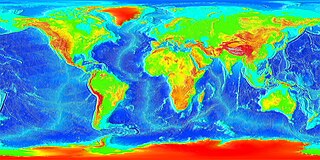Related Research Articles

The seabed is the bottom of the ocean, no matter how deep. All floors of the ocean are known as 'seabeds'.
Alcanivorax pacificus is a pyrene-degrading marine gammaprotobacterium. It is of the genus Alcanivorax, a group of marine bacteria known for degrading hydrocarbons. When originally proposed, the genus Alcanivorax comprised six distinguishable species. However, A. pacificus, a seventh strain, was isolated from deep sea sediments in the West Pacific Ocean by Shanghai Majorbio Bio-pharm Technology Co., Ltd. in 2011. A. pacificus’s ability to degrade hydrocarbons can be employed for cleaning up oil-contaminated oceans through bioremediation. The genomic differences present in this strain of Alcanivorax that distinguish it from the original consortium are important to understand to better utilize this bacteria for bioremediation.
Nocardioides is a Gram-positive, mesophilic and aerobic bacterial genus from the family of Nocardioidaceae.
Nocardioides aquaticus is a strictly aerobic, rod-shaped and non-motile bacterium from the genus of Nocardioides which has been isolated from tidal flat sediments in Korea.
Nocardioides antarcticus is a gram-positive, aerobic, rod-shaped and non-motile bacterium from the genus Nocardioides that has been isolated from marine sediments from Ardley Cove near King George Island in Antarctica.
Nocardioides dokdonensis is a bacterium from the genus Nocardioides which has been isolated from sand sediments from the beach of the Dokdo Island in Korea .
Nocardioides ganghwensis is a strictly aerobic, rod-shaped and non-motile bacterium from the genus of Nocardioides which has been isolated from tidal flat sediments on the Ganghwa Island in Korea.
Nocardioides ginsengisoli is a Gram-positive, rod-shaped and non-spore-forming bacterium from the genus of Nocardioides which has been isolated from soil from a ginseng field in Pocheon in Korea.
Nocardioides hungaricus is a Gram-positive and rod-shaped bacterium from the genus of Nocardioides which has been isolated from a drinking water supply system in Budapest in Hungary.
Nocardioides insulae is a Gram-positive bacterium from the genus of Nocardioides which has been isolated from soil from Dokdo in Korea.
Nocardioides kribbensis is a bacterium from the genus of Nocardioides which has been isolated from alkaline soil in Korea.
Nocardioides lentus is a Gram-positive bacterium from the genus of Nocardioides which has been isolated from alkaline soil in Korea.
Nocardioides marinquilinus is a Gram-positive, strictly aerobic, non-spore-forming, short rod-shaped and non-motile bacterium from the genus of Nocardioides which has been isolated from coastal seawater in Korea.
Nocardioides mesophilus is a mesophilic, rod-shaped, and motile bacterium from the genus of Nocardioides which has been isolated from soil from the Bigeum Island in Korea.
Nocardioides panacihumi is a Gram-positive, strictly aerobic, non-spore-forming and non-motile bacterium from the genus of Nocardioides which has been isolated from soil from a ginseng field in Pocheon in Korea.
Nocardioides sediminis is a Gram-positive, aerobic and short-rod-shaped bacterium from the genus of Nocardioides which has been isolated from sediments from the Bigeum Island in Korea.
Nocardioides rotundus is a Gram-positive and aerobic bacterium in the genus Nocardioides which has been isolated from deep seawater from the western Pacific.
Brevundimonas denitrificans is a Gram-negative, aerobic, heterotrophic and denitrifying bacterium from the genus of Brevundimonas which has been isolated from deep seafloor sediments from Japan.
Sunxiuqinia dokdonensis is a facultatively anaerobic bacterium from the genus of Sunxiuqinia which has been isolated from deep sub-seafloor sediments from the Dokdo Island.
Marinilactibacillus piezotolerans is a Gram-positive, piezotolerant, non-spore-forming, rod-shaped and non-motile bacterium from the genus Marinilactibacillus which has been isolated from deep sub-seafloor sediments from Nankai Trough.
References
- 1 2 Parte, A.C. "Nocardioides". LPSN .
- ↑ "Nocardioides pacificus Taxon Passport - StrainInfo". www.straininfo.net.
- ↑ "Nocardioides pacificus". www.uniprot.org.
- ↑ "Details: DSM-27278". www.dsmz.de.
- ↑ Fan, X; Qiao, Y; Gao, X; Zhang, XH (July 2014). "Nocardioides pacificus sp. nov., isolated from deep sub-seafloor sediment". International Journal of Systematic and Evolutionary Microbiology. 64 (Pt 7): 2217–22. doi: 10.1099/ijs.0.059873-0 . PMID 24699067.